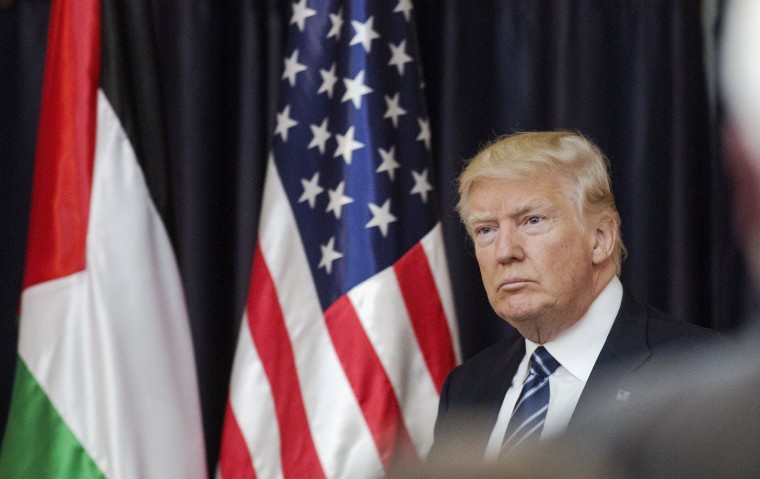Just four months into his presidency, Donald Trump seemed quite confident about negotiations between Israelis and Palestinians. In fact, as regular readers may recall, the Republican boasted there's a "very, very good chance" his administration would help strike a deal for Middle East peace.
"It's something, frankly, maybe not as difficult as people have thought over the years," the president added.
Fifteen months later, I half-expect Trump to declare, "Nobody knew talks between Israelis and Palestinians could be so complicated." Take yesterday, for example.
The Trump administration ordered the closure of the Palestinian diplomatic mission in Washington on Monday and threatened sanctions against the International Criminal Court if it pursues investigations against the U.S., Israel, or other allies. The moves are likely to harden Palestinian resistance to the U.S. role as a peace broker.The administration cited the refusal of Palestinian leaders to enter into peace talks with Israel as the reason for closing the Palestinian Liberation Organization office, although the U.S. has yet to present its plan to resolve the Israel-Palestinian conflict. The Palestinians accused the administration of dismantling decades of U.S. engagement with them.
The Trump administration also announced the withdrawal of $25 million it had committed to the East Jerusalem Hospital Network. As NBC News reported, this followed last month's announcement that the Trump administration is cutting more than $200 million in aid to the Palestinians. It also comes on the heels of the Trump administration announcing the end of funding to the United Nations relief agency for Palestinian refugees.
Of course, it also follows the American president's decision to recognize Jerusalem as Israel's capital -- a highly contentious point in negotiations, which Trump gave up in exchange for nothing, and which had the predictable effect of pushing Palestinians further away.
Over the weekend, the Palestinian Authority described Trump's tactics as "an act of political blackmail." That's hardly an outlandish accusation.
Indeed, Trump described his plan with great candor just last week: "I stopped massive amounts of money that we were paying to the Palestinians and the Palestinian leaders. We were -- the United States was paying them tremendous amounts of money. And I'd say, 'You'll get money, but we're not paying you until we make a deal. If we don't make a deal, we're not paying.' And that's going to have a little impact."
There's nothing subtle about the strategy. Trump envisions a dynamic in which he punishes Palestinians into submission, which is unlikely to have the intended effect.
Whether U.S. officials understand this or not remains an open question. At yesterday's White House briefing, a reporter said to press secretary Sarah Huckabee Sanders, "The Palestinians are saying that the U.S. can no longer be an honest broker. [The closure of the Palestinian diplomatic mission] is another example, they say, of the fact that the U.S. is too aligned with Israel. Is that not the case?"
Sanders replied, "Certainly we have a great deal of support with our friend and ally in Israel."
Imagine you're trying to negotiate a complex agreement between Group A and Group B. After you repeatedly favor B over A, A's representatives suggest you're not a fair and reliable arbiter.
In response, you say, "Yeah, but things with Group B are great." How likely is it that Group A is going to trust you?
If Trump still thinks there's a "very, very good chance" he's going to strike a deal for Middle East, it's time to lower expectations.
